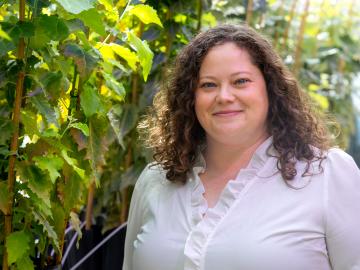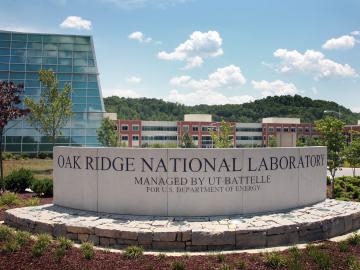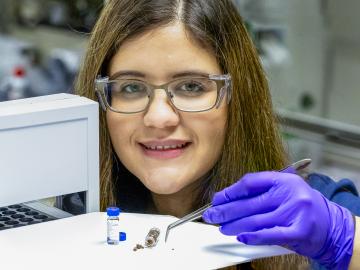
Filter News
Area of Research
- Advanced Manufacturing (2)
- Biology and Environment (50)
- Computational Engineering (1)
- Computer Science (3)
- Energy Frontier Research Centers (1)
- Energy Science (58)
- Fusion and Fission (7)
- Isotope Development and Production (1)
- Isotopes (5)
- Materials (74)
- Materials Characterization (1)
- Materials for Computing (7)
- Materials Under Extremes (1)
- National Security (16)
- Neutron Science (52)
- Nuclear Science and Technology (4)
- Quantum information Science (1)
- Supercomputing (35)
News Type
News Topics
- (-) Biology (53)
- (-) Biomedical (30)
- (-) Clean Water (9)
- (-) Cybersecurity (23)
- (-) Element Discovery (1)
- (-) Materials Science (71)
- (-) Nanotechnology (35)
- (-) Neutron Science (64)
- (-) Quantum Science (36)
- 3-D Printing/Advanced Manufacturing (61)
- Advanced Reactors (14)
- Artificial Intelligence (44)
- Big Data (20)
- Bioenergy (48)
- Biotechnology (17)
- Buildings (25)
- Chemical Sciences (44)
- Composites (15)
- Computer Science (77)
- Coronavirus (23)
- Critical Materials (13)
- Education (3)
- Energy Storage (56)
- Environment (78)
- Exascale Computing (16)
- Fossil Energy (1)
- Frontier (19)
- Fusion (26)
- Grid (23)
- High-Performance Computing (43)
- Hydropower (2)
- Isotopes (33)
- ITER (3)
- Machine Learning (23)
- Materials (69)
- Mathematics (5)
- Mercury (6)
- Microelectronics (1)
- Microscopy (28)
- Molten Salt (3)
- National Security (35)
- Nuclear Energy (44)
- Partnerships (33)
- Physics (42)
- Polymers (18)
- Quantum Computing (14)
- Security (19)
- Simulation (18)
- Space Exploration (3)
- Statistics (1)
- Summit (24)
- Transportation (38)
Media Contacts

Debjani Singh, a senior scientist at ORNL, leads the HydroSource project, which enhances hydropower research by making water data more accessible and useful. With a background in water resources, data science, and earth science, Singh applies innovative tools like AI to advance research. Her career, shaped by her early exposure to science in India, focuses on bridging research with practical applications.

Seven entrepreneurs comprise the next cohort of Innovation Crossroads, a DOE Lab-Embedded Entrepreneurship Program node based at ORNL. The program provides energy-related startup founders from across the nation with access to ORNL’s unique scientific resources and capabilities, as well as connect them with experts, mentors and networks to accelerate their efforts to take their world-changing ideas to the marketplace.

Brian Sanders is focused on impactful, multidisciplinary science at Oak Ridge National Laboratory, developing solutions for everything from improved imaging of plant-microbe interactions that influence ecosystem health to advancing new treatments for cancer and viral infections.

To better predict long-term flooding risk, scientists at the Department of Energy’s Oak Ridge National Laboratory developed a 3D modeling framework that captures the complex dynamics of water as it flows across the landscape. The framework seeks to provide valuable insights into which communities are most vulnerable as the climate changes, and was developed for a project that’s assessing climate risk and mitigation pathways for an urban area along the Southeast Texas coast.

John Lagergren, a staff scientist in Oak Ridge National Laboratory’s Plant Systems Biology group, is using his expertise in applied math and machine learning to develop neural networks to quickly analyze the vast amounts of data on plant traits amassed at ORNL’s Advanced Plant Phenotyping Laboratory.

Jens Dilling has been named associate laboratory director for the Neutron Sciences Directorate at the Department of Energy’s Oak Ridge National Laboratory, effective April 1.

Alyssa Carrell started her science career studying the tallest inhabitants in the forest, but today is focused on some of its smallest — the microbial organisms that play an outsized role in plant health.
The United States could triple its current bioeconomy by producing more than 1 billion tons per year of plant-based biomass for renewable fuels, while meeting projected demands for food, feed, fiber, conventional forest products and exports, according to the DOE’s latest Billion-Ton Report led by ORNL.

Two different teams that included Oak Ridge National Laboratory employees were honored Feb. 20 with Secretary’s Honor Achievement Awards from the Department of Energy. This is DOE's highest form of employee recognition.

Ilenne Del Valle is merging her expertise in synthetic biology and environmental science to develop new technologies to help scientists better understand and engineer ecosystems for climate resilience.


